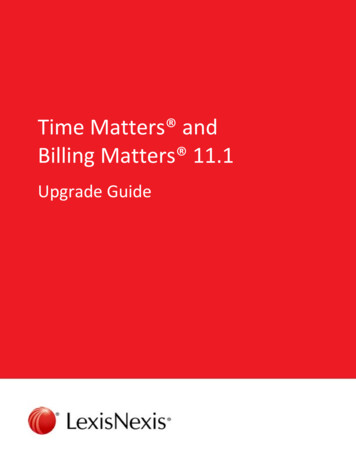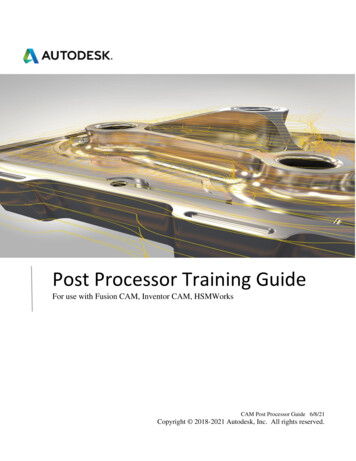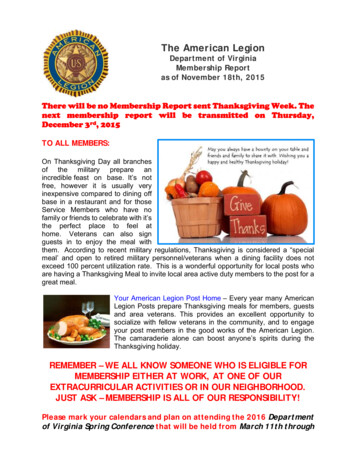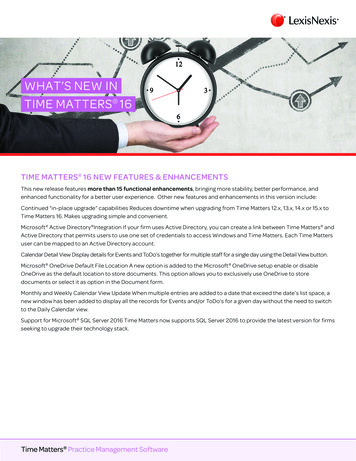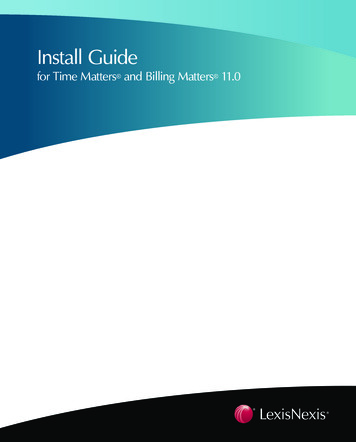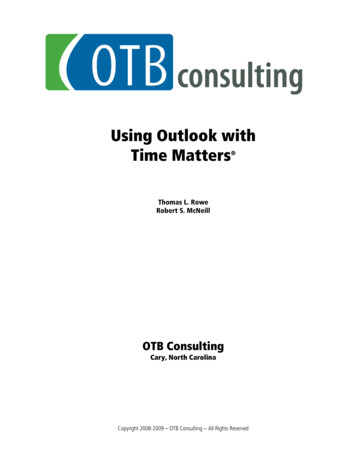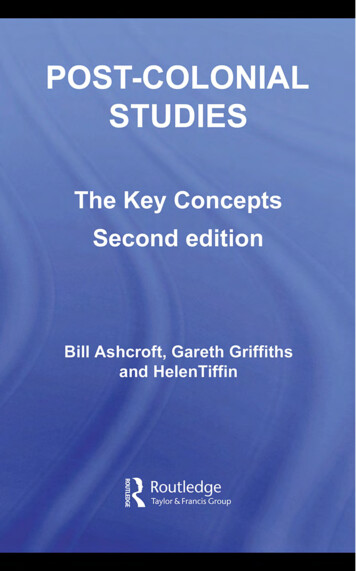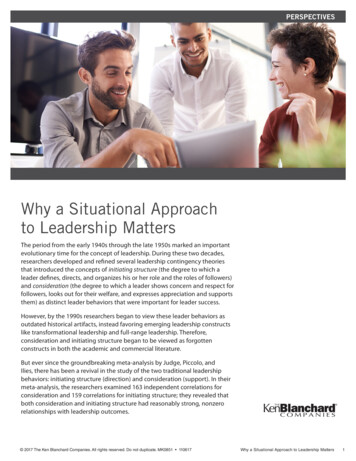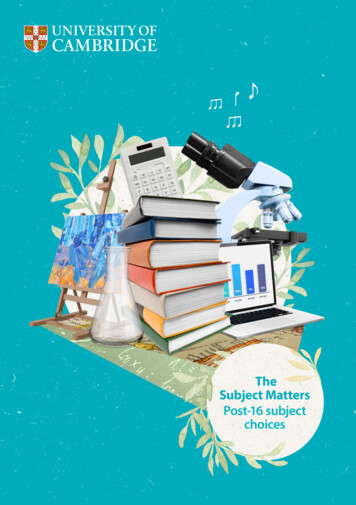
Transcription
TheSubject MattersPost-16 subjectchoices
2ContentsTheSubjectMattersThe post-16 subject choices that you make canhave a major impact on your course and universityoptions. Selective universities such as theUniversity of Cambridge often consider not onlythe individual subjects, but also the combination ofsubjects you’re studying and how effectively theywill prepare you for your chosen course. This leafletintroduces higher education, talks about universitylife and provides information to help you makeinformed post-16 subject choices.ContentsWhat is higher education?3Why go to university?4University life5How is Cambridge different?7Choosing post-16 subjects8I know which course I want to study. 9I want to keep my options open.11How to apply13Find out more15
www.undergraduate.study.cam.ac.ukWhat is highereducation?Higher education is the term used todescribe courses of study at universities thatare at a higher level than those studied atschool or college. These courses lead toqualifications called degrees.Most people start higher education courses atage 18, after studying A Levels or equivalentqualifications in Years 12 and 13. Some studentsdecide to take a year out first (a gap year) or maycome back to studying later in life as a maturestudent.Higher education courses are available at a widerange of universities and colleges all over theUK, and there are currently more than 50,000courses and 395 different places to study.50,000 courses in the UK(UCAS, www.ucas.com)395 places to study in the UK(UCAS, www.ucas.com)Please note2.53The information in this leaflet is written by theUniversity of Cambridge but will be relevant toother selective universities.million studentsThis publication offers general guidance in thecontext of the University of Cambridge and youare encouraged to check university websites,the UCAS website or contact universitiesdirectly for more detailed, specific andup-to-date information.(Higher Education StatisticsAgency, February 2020)studying at UK highereducation providers3
4Why go to university?Why go to university?To study a particular subjectin more depthYou may already enjoy a particular subject atschool/college or you may want to branch out intoa new area, eg to study surveying because you likegeography, or zoology because you enjoy biology.The career you’re interestedin may require a degreelevel qualificationTo pursue certain careers you’ll need specificqualifications. For example, to become a doctor,dentist, architect, town planner, teacher, lawyer orchartered engineer, you’re required to have adegree. Or you may be interested in one of themany high-level jobs that are open to people withany degree – some professions require a degree ina particular subject, but many more jobs don’tspecify a degree subject.For the university experienceBeing a student at university widens yourexperience of the world. You meet new peoplefrom all over the world and from a wide variety ofbackgrounds and cultures. You’ll also have theopportunity to get involved in a huge range ofsocial activities and to live away from home if youwant to. All these things make your time atuniversity an all-round experience, as well as givingyou a chance to develop a range of skills which arehighly valued by employers.‘Going to university is a greatway to expand your knowledge,meet new people, and enjoynew experiences.’(UCAS, www.ucas.com)
www.undergraduate.study.cam.ac.uk5University lifeStudyingUniversity study is a much more independentexperience than school or college – for a start,you’ll have chosen the subject(s) that you mostenjoy! You’ll have a weekly timetable with anumber of lectures (where large numbers ofstudents listen to and make notes on theinformation given by the lecturer) and classes/seminars (which are smaller groups moresimilar to the class sizes you’re currently usedto). Some subjects include practical sessions aswell, eg in laboratories or design studios.However, the biggest difference is that you willbe responsible for your own learning and,alongside lectures and classes, be expected tospend a lot of the week in private study time.This will include further reading, research andrevision, and (depending on the subject)preparing for group discussions, writing essays,or working through problems.Social activitiesUniversities offer lots of socialopportunities and activities. Everyuniversity has a Students’ Union whichprovides places to meet, eat and drink, aswell as organising regular entertainmentsuch as club nights and live music. There’salso a variety of university clubs andsocieties – ranging from sports clubs,cultural groups, community action groups,student newspapers and radio stations, todrama societies and music groups. Anyonewith an interest and enthusiasm can usuallyfind a group to join, or start their own!
6University lifeAccommodationSupportMany students, even if they go to a local university,choose not to live at home in order to be moreindependent. Most universities make this easier byproviding accommodation for many of theirstudents, particularly in their first year.Starting university is an exciting experience, butbeing independent, possibly for the first time inyour life, doesn’t mean that there’s no one to turnto for help.Accommodation could be in a hall of residence orCollege for large numbers of students, where you’llusually have your own study bedroom and payrent to the university or College. Alternatively,some students live in small groups in sharedhouses or flats.Accommodation atCambridgeCambridge guarantee – mostundergraduates are guaranteedCollege-owned accommodation for atleast three years.Shorter contracts – Colleges offershorter annual accommodationcontracts, often between 26 and 39weeks, so you don’t usually pay rentduring the vacations.Not far to travel – Collegeaccommodation is close to the citycentre and within walking or cyclingdistance of departments.Accommodation varies across theCambridge Colleges and you shouldcheck individual College websites forthe most up-to-date information:www.cam.ac.uk/ugcolls.Most students need a bit of time to get used totheir new life and routine, and you are encouragedto seek advice, ask questions and raise anyconcerns at every stage of your university journey.There will be a variety of people you can speak to,such as your personal tutor in your department/College, the warden in your hall of residence, or awelfare officer.You can find out more about the support offeredat Cambridge on our website:www.cam.ac.uk/support.
www.undergraduate.study.cam.ac.uk7How isCambridgedifferent?TeachingDepartments and CollegesOur teaching staff includes many national and worldsubject leaders. In addition to lectures and seminars,at Cambridge you’ll have supervisions, which arevery small teaching sessions, typically consisting ofone to three students. Supervisions are a great wayof helping you to explore course material in greaterdepth, investigate new approaches, receive regularfeedback and clarify anything you’re unsure of.Cambridge is structured a little bit differentlyfrom most other universities in that it’s acollegiate University. This means it’s made up offaculties and departments in academic subjectsand a number of Colleges. There are 31 Collegesat Cambridge, of which 29 accept applicationsfor undergraduate study.It’s the University (through the faculties/departments) that determines course content;organises lectures, seminars, practicals andprojects; sets and marks examinations; andawards degrees.If you apply to the University, your application isconsidered by one of the Colleges. Your Collegeis also the place where you live, eat, socialise,and often receive your small group tuition(supervisions). Much more than just a hall ofresidence, your College can become a key partof your community and offers welfare supportas well.
8Choosing post-16 subjectsChoosing post-16 subjectsFor admission to their degree courses, it’s common for universities torequire applicants to have qualifications in particular subjects that arerelevant to each degree. Therefore, the A Level subject choices you makein Year 11 (or equivalent) can have a significant effect on the universitiesand course options available to you.This leaflet provides general information about keysubjects that we require applicants to have for admissionto degree courses at the University of Cambridge. Wehope this will help you make informed decisions so thatyour A Level choices won’t limit your options should youwish to apply to Cambridge in the future.If you’ll be studying qualifications other than A Levels (egthe International Baccalaureate, Scottish Advanced Highersand the Irish Leaving Certificate) the advice that follows isbroadly the same. Guidance for a range of qualifications isavailable on the Undergraduate Study website(www.cam.ac.uk/entrancerequirements) and if youhave any queries you should contact us at as early a stageas possible.What are we looking for?Everyone who applies to Cambridge is treatedand assessed individually. We look for differentthings in different people for different courses.However, all Admissions Tutors are looking forthe students who they believe: have the strongest academic ability andpotential have genuine interest in and are best suitedto the course they have applied for will benefit from and flourish in the learningenvironment we offer
www.undergraduate.study.cam.ac.uk9I know which courseI want to study.Many Cambridge courses require qualificationsin certain subjects and for such subjects to bepassed, normally with an A or A* grade at ALevel (or equivalent). Applicants may berequired to achieve an A* in one or moreparticular subjects, depending on individualcircumstances.If you’ve already decided on a course that you’dlike to study at university, we recommend thatyou take a look at the information on coursesand entry requirements given on our website(www.cam.ac.uk/courses andwww.cam.ac.uk/entrancerequirements) andon websites of other universities you’reconsidering. Do this before you finalise yourA Level subject choices to check that they’ll beappropriate for your application.Arts and social sciencesIf you’d like to study an arts or socialsciences course at university but you’re notsure which one, then we’d recommendconsidering English Literature¹, History,languages and Mathematics. Choosing oneor more of these can provide a goodfoundation for your application.Other good choices to combine thesesubjects with include: an additionallanguage, Ancient History, ClassicalCivilisation, Economics, English Language,Further Mathematics², Geography, Politics,History of Art, Law, Music, Philosophy,Psychology, Religious Studies, sciences(Biology, Chemistry or Physics) or Sociology.¹ English Language and Literature can be an acceptablealternative at some Cambridge Colleges.² If your school does not offer Further Mathematics, theAdvanced Mathematics Support Programme (www.amsp.org.uk)may be able to help.
10I know which course I want to study.SciencesIf you think you’d like to study a sciencecourse at university but you’re not surewhich one, then you’re advised to take atleast two, and ideally three, of Biology,Chemistry, Mathematics, FurtherMathematics, and Physics. Some pairingsof these subjects are more natural thanothers. The most natural pairs are Biologyand Chemistry, Chemistry and Physics,and Mathematics and Physics. Anotheruseful combination, particularly forcourses where A Level Mathematics isrequired, is Mathematics, FurtherMathematics and Physics.‘The subjects you study at sixthform or college will influence thedegrees which are open to youat university and potentiallyyour future career.’(Informed Choices,www.informedchoices.ac.uk)If you are planning to study ChemicalEngineering, biological sciences ormedical sciences you should takeChemistry. For physical sciences orEngineering you should take A LevelMathematics and Physics, and ideallyFurther Mathematics.Other possible subject choices – forinstance Computer Science, Electronicsor Psychology – may be usefulpreparation for some of our sciencecourses. If you are contemplating any ofthese subjects we would recommendchecking entry requirements for thecourses you are considering.
www.undergraduate.study.cam.ac.ukI want to keep myoptions open.Choosing subjects that genuinely keep youroptions open is trickier than you might think.We often encounter students who havetaken a mixture of arts and science subjectsin the belief that it will keep their optionsopen. While such a subject combinationdoes provide a suitable preparation for manyarts and social science courses at theUniversity, it can make you a less competitiveapplicant for Cambridge’s science courses(almost all successful applicants for ourscience courses have three or even fourscience or mathematics A Levels).There are certain A Level subjects that areessential for a number of courses atCambridge. Therefore, choosing one ormore of these can help keep your optionsopen. These subjects include: a language,Chemistry, History, English, Mathematics andPhysics. Other subjects that also facilitatecourse choice at Cambridge include Biologyand Further Mathematics.Should I take three orfour A levels?Typical offers from Cambridge are basedon students taking three A Levels (orequivalent) together in Year 13, and mostCambridge applicants are studying threeor four A Level subjects in Years 12 and 13.Applicants taking four subjects won’tnormally be at an advantage comparedwith those taking three, as we’d ratherapplicants develop greater knowledge ofthe subjects most relevant to theirchosen course than accumulateadditional A Levels. However, competitiveapplicants for science subjects andEconomics often have FurtherMathematics as a fourth subject.In all cases, your individual circumstanceswill be taken into account during theadmissions process.11
12I want to keep my options open.We aim to offer admission to studentsof the highest intellectual potential,irrespective of social, racial, religiousand financial considerations.(University of Cambridge Admissions Policy,www.cam.ac.uk/admissionspolicy)Other A Level SubjectsThere are many other A Level subjects that wehaven’t mentioned at all in this leaflet. The fact thatwe haven’t mentioned them doesn’t mean that wethink they’re not individually valuable. Subjectssuch as Drama and Theatre and Art and Design canbe appropriate preparation for certain coursessuch as English or Architecture. However, asCambridge does not typically offer vocationalsubjects, A Levels such as Business, Photography orMedia Studies may not be appropriate. If you areconsidering a Vocational Level 3 course as one ofyour three choices, we would advise you to checkthe entry requirements for your chosen course, asthey are not usually accepted. If you wish to takeany of these subjects and you want to apply toCambridge or the most competitive Russell Groupuniversities, we’d advise you to take themalongside three academic A Levels, rather than asone of three.Critical Thinking and Key Skills aren’t consideredsuitable options as one of your three A Levelchoices for any course at Cambridge. We welcomecandidates with the Extended Project Qualification(EPQ), as it helps develop independent study andresearch skills which are valuable for highereducation. However this wouldn’t normally formpart of a conditional offer.A common misconception isthat you have to go into a jobdirectly related to the degreesubject that you studied. Infact, for the majority ofvacancies we advertise eachyear, the employers wouldwelcome applications fromany discipline.(Cambridge Careers Guide, 2021)
www.undergraduate.study.cam.ac.uk13How to applyHow do I choose acourse at university?A good place to start is to think about thesubject(s) you’re interested in personally – thismight be one of your school/college subjects orsomething you do in your spare time.A university degree is about focusing on one ortwo particular subjects for several years, so it’simportant to choose something you enjoy!Many universities produce printed or onlineprospectuses which give details of their degreecourses, entrance requirements and otherimportant information such as sports and socialfacilities and what the town/city is like.Reading websites and prospectuses, and visitinguniversities and colleges on open days will helpyou to work out what you’d like to study andwhere. You’ll also be able to find out whatgrades you’ll need to get into the university ofyour choice. Your school or college, or the UCASwebsite (www.ucas.com), can also offer furtherhelp and guidance.When can I choose?It’s never too early to start thinking abouthigher education. You’ll usually have thechance to speak to teachers and careersadvisers in Years 10 or 11 to discuss youroptions when you leave school or college,including the possibility of going touniversity. You may find it helpful to look ata few prospectuses or university websites inYear 11, but bear in mind that courses andentry requirements do change from year toyear. If you look at a prospectus or universitywebsite several years in advance, the detailsmay well have changed by the time youcome to apply, so do check again beforeyou apply.It’s important to try out some of the thingsyou’re interested in. Talk to people who dothe job(s) you’d like to do, or to studentswho have studied the course that interestsyou. This will help you to decide if it’ssomething you’ll enjoy and will be good at.Once you’re in Year 12, you’ll need to dosome research into courses and universitiesby consulting websites and prospectuses,looking at higher education directories andguides, and going to careers fairs oruniversity open days. Most of theinformation you need can be found onuniversity websites, but many schools andcolleges will have copies of prospectuses intheir libraries, and some universities offerthe opportunity to order your own printedprospectus.
14How to applyWhen and how can I apply?Students usually apply during the first or secondterm of Year 13, in the year before they want to starttheir course. In the UK, students apply to universitiesthrough the Universities and Colleges AdmissionsService (UCAS). You’ll complete one application, onwhich you you can choose up to five institutions toapply to. You should be able to get help andsupport from your school or college when youapply, and university admissions teams can be agreat source of advice.What else do universitieslook for?Many universities will be interested in extracurricular activities, including your hobbies andinterests, work experience, voluntary work and anypositions of responsibility that you may have heldeither in school/college or elsewhere. At Cambridge,our admissions decisions are based on academiccriteria (ability and potential), so activities that are ofno relevance to your course will not increase yourchances of receiving an offer. We do look forevidence of wider engagement within your area ofacademic interest – we call these activities‘super-curricular’. You can find more details on ourwebsite; -activities.The deadline for applying to eitherCambridge or Oxford is15 October¹¹Other application deadlines may apply for international and matureapplicants and for our Foundation Year course. Please note, you can’tapply to both the Universities of Cambridge and Oxford in the same year.
www.undergraduate.study.cam.ac.uk15Find out moreYour teachers and careers advisers will be able to give you help and advice about applying to university. Inaddition, all universities arrange activities and events – such as masterclasses, campus tours and summerschools – to help students find out more about higher education.When you’re in Year 12, you may have the opportunity to attend a higher education convention in yourregion where you’ll be able to talk to representatives from a large number of universities, as well as pick upcopies of prospectuses. Someone from a university may also visit your school or college to give a talk.If you want to visit in person to find out more, you’ll find that most universities and colleges organise opendays to allow you to do just that.Visit the links below for more information about higher education:Undergraduate Study website:www.undergraduate.study.cam.ac.ukOn our Undergraduate Study website you’ll find information about the courses that we offer, as well asmore general information about what it’s like to study at Cambridge and the application process. Eachcourse page has information about the topics you’ll cover, teaching, and assessment, so it’s a great place tolook to start considering if a course here would suit you. You’ll also find information about events for Year12 (or equivalent) students, such as Subject Masterclasses and Cambridge Open Days.Informed Choices website:www.informedchoices.ac.ukInformed Choices is aimed at pupils aged 14 and upwards who are considering university and wantinformation to help them choose the right subjects to study at sixth form or college. The guidance iswritten by admissions directors from the 24 Russell Group universities and provides information on whysubject choice matters.HE website:www.myheplus.comOnce you have chosen the university course you would like to study, visit the HE Plus website. This websitehas a wide range of subject resources to help you get started with ‘super-curricular’ work. Super-curricularactivities include anything you do beyond your school/college work which develops your subject interest,so it’s a great way to show admissions staff which parts of your subject you find most interesting and whyyou want to study a specific course.
For more information contact theCambridge Admissions Office:Cambridge Admissions OfficeUniversity of CambridgeStudent Services CentreNew Museums SiteCambridge CB2 .ac.ukDetails are correct at the time of publication (February 2022) but should be checked against the Undergraduate Studywebsite and other university websites for the most up-to-date information. University of Cambridge, 2022.
To study a particular subject in more depth You may already enjoy a particular subject at school/college or you may want to branch out into a new area, eg to study surveying because you like geography, or zoology because you enjoy biology. The career you're interested in may require a degree level qualification

